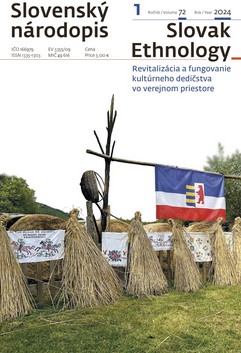Nedostatok tradície. Sociálna starostlivosť o deti na slovenskom území v období prvej Československej republiky. Sizyfovská práca, druh ušľachtilého športu starších dám a dobrosrdečných osôb či zrod veľkého činu?
Lack of Tradition. Social Care for Children in the Slovak Territory in the Period of the First Czechoslovak Republic. Sisyphus’s Work, a Noble Sport of Elderly Ladies and Kind-hearted Persons or the Birth of a Great Deed?
Author(s): Ivana ŠuhajdováSubject(s): Social history, History of Education, State/Government and Education, Family and social welfare, Welfare services, Pre-WW I & WW I (1900 -1919), Interwar Period (1920 - 1939)
Published by: Ústav etnológie a sociálnej antropológie Slovenskej akadémie vied
Keywords: child; childhood; child labour; social care; children’s homes; educational programme; first Czechoslovak Republic;
Summary/Abstract: The dissolution of the Austro-Hungarian Empire meant creating a new state system for the Slovak people in the form of the First Czechoslovak Republic. Although a united state of two nations, the Slovak territory was less economically, educationally and socially developed. Based on a content analysis of archival documents, the contemporary periodical Care for Youth and the legal regulation of the period under study, the study answers the questions: What was the initial state of social care for children in the Slovak territory? What specific forms and content contributed to its development? What was the significance of children’s homes in social care? The results show that the Slovak nation found itself in a completely new situation in the field of social care for children, a situation it had never known before; it did not have its own system of child care. The pauper care made the first beginnings, the implementation of which was in the competence of the municipalities. The latter focused on the provision of food and clothing and the establishment of orphanages. Gradually, charitable associations, individuals and the church began to care for children. There was no direct involvement of the state, which provided only subsidies. In the case of orphanages, there was a struggle throughout the period to create their mission. Nevertheless, the workers of the orphanages focused their care on social and educational activities, paying attention to regional and local games, dances and songs.
Journal: Slovenský národopis
- Issue Year: 72/2024
- Issue No: 1
- Page Range: 104-122
- Page Count: 19
- Language: Slovak

